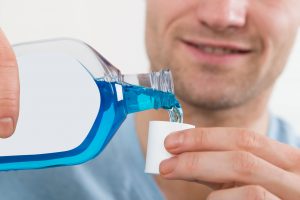
Mouth alcohol is a factor that can throw off a breath test (Breathalyzer). It happens when a small amount of alcohol remains in the mouth or throat, contaminating your breath as you blow into the device. It gives a falsely high BAC (blood alcohol concentration) reading, and can send innocent people to jail for DUI.
Breath tests are one of the most common pieces of evidence used in DUI cases, but also one of the most unreliable. Mouth alcohol is also common. When it becomes a factor in a DUI case, it can mean that the breath test evidence is thrown out. This can change the course of your DUI case.
To know whether mouth alcohol is a factor in your case, you need to understand both how breath test devices work and what causes mouth alcohol.
How a Breath Test Works
It’s not illegal to drive with alcohol in your stomach. It’s only illegal if it impairs your driving, or if your BAC is at or above .08%. Thus, the best way to prove a DUI case is to test someone’s BAC.
A breath test cannot directly measure BAC, however, because it doesn’t analyze your blood. Instead, it relies on the amount of alcohol particles in your breath as you breathe out. The test needs to look at the air from deep inside your lungs, where alcohol is picked up from your blood stream. This is why breath tests force you to blow a long time, so you get a steady stream of deep-lung air.
But what happens if that lung air gets contaminated on the way up?
That’s what happens when there is alcohol of any kind in the mouth or throat as you take the test. This “mouth alcohol” puts additional alcohol particles into the air, even though it does not reflect on your BAC. The test then thinks you’re far more inebriated than you are. Even a stone sober person can test over the .08% limit if they have mouth alcohol.
Where Does Mouth Alcohol Come From?
Normally, when you drink alcohol, it gets out of your mouth fairly quickly—most traces are gone within 15 minutes. But there are times when either alcohol ends up back in the mouth, or something else creates mouth alcohol and throws off the test. Here are the most common sources of mouth alcohol:
- Burping. Any burping can throw a small amount of alcohol back up into the mouth. Even this small trace can result in a large discrepancy in breath test results. This is why police are required to perform a 15 minute “observation period” before administering the breath test. During this period they are supposed to watch that you don’t burp, hiccup, or vomit at all. However, police sometimes skip the observation period or they don’t pay close attention.
- Heart burn, GERD or acid reflux. Any form of heartburn can lead to mouth alcohol. This includes acid reflux and GERD (gastroesophageal reflux disease), a chronic condition. Reflux or heartburn creates mouth alcohol because it causes the contents of the stomach to flow back into the esophagus (throat) and contaminate your breath.
- Mouthwash. Mouthwash made with alcohol, such as Scope and Listerine, are essentially cocktails. Scope for example is almost 19% alcohol by volume, and Listerine is over 26%—that’s 54 proof. And mouthwash is a common method people use to cover up the “smell” of alcohol on their breath. If you used mouthwash, the residue could stay in your mouth and throw off the breath test.
- Breath spray. Some breath sprays also have an alcohol base, and have the same effect as mouth wash.
- Medicines. Medicines such as Nyquil contain alcohol as well. These are particularly tricky because they are thick and syrupy, potentially leaving residue in the mouth much longer. If a medicine causes drowsiness or wooziness, the effects could be mistakenly interpreted as drunkenness.
- Dental work. Do you have dentures, braces, or any form of orthodontics? These devices can “trap” food or liquid (this is why they need to be cleaned so often). If they trap traces of alcohol, it will skew the breath test.
It’s worth noting that people with diabetes, or those who follow a high protein/low carb diet, can also get false positives on a breath test. This isn’t technically mouth alcohol, but a related factor where your natural blood chemistry contains ketones, which the breath test may misread as alcohol particles.
Could Mouth Alcohol Be a Factor in Your DUI Case?
The best way to find out if mouth alcohol is a valid defense in your case is to talk to a Los Angeles DUI lawyer. We can connect you with an experienced, knowledgeable DUI attorney and arrange a free consultation. Simply fill out the form to the right and get your consultation today.







